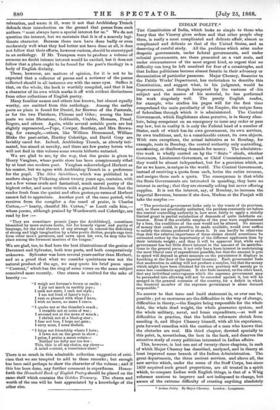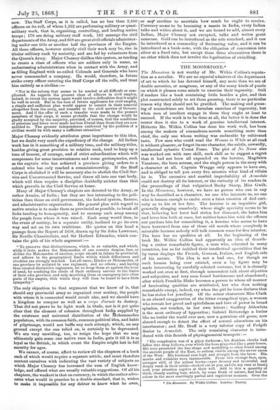INDIAN POLITY.* THE Constitution of India, which looks so simple
to those who fancy that the Viceroy gives orders and that other people obey them, is really a most complicated and delicate affair, almost as complicated and delicate as that of the United States, and as deserving of careful study. All the problems which arise under despotic governments, under federal governments, and under colonial governments, are there presented on a vast scale, and under circumstances of the most urgent kind, so urgent that no difficulty can long be left unsolved for fear of a catastrophe, and that Indian politicians become almost fanatic in their advocacy or denunciation of particular panaceas. Major Chesney, financier to the Public Works' Department, has undertaken to describe this Constitution, and suggest what, in his judgment, would be improvements, and though hampered by the vastness of • his subject and the masses of his material, he has performed his work singularly well. The purely English reader, for example, who studies his pages will for the first time comprehend the main peculiarity of the Empire, the unique form of federalism through which it is administered. The Central Government, which Englishmen alone perceive, is in theory abso- lute, being competent on an emergency to issue any order or pass any law, but in reality it is only the Federal head of a number of States, each of which has its own government, its own services, its own traditions, and, to a considerable extent, its own objects.
With rare exceptions, the actual initiative as to Bombay, for example, rests in Bombay, the central authority only controlling, sanctioning, or disallowing demands for money. The administra- tive work is wholly carried on by the " State " chiefs, whether Governors, Lieutenant-Governors, or Chief Commissioners ; and they would be almost independent, but for a provision which, so far as we know, is unique in the world. The Central Government, instead of receiving a quota from each, levies the entire revenue, and assigns them each a quota. The consequence is that- while the State Governments are interested in spending, they have no interest in saving ; that they are eternally asking but never offering supplies. It is not the interest, say, of Bombay, to increase the Imperial Revenue, because if she does, Madras or the Punjab will take the surplus :—
" The provincial government looks only to the wants of its province, and, as these are practically unlimited, the problem constantly set before the central controlling authority is, how most fairly to apply a strictly limited grant in partial satisfaction of demands of quite indefinite ex- tension. Even if the available surplus of the year were supplemented by a loan, the conditions of the case would not be altered. No amount of money that could, in practice, be made available, would over suffice to satisfy the claims preferred to share it. It can hardly be otherwise than that the relative importance of these claims should sometimes be estimated rather by the importunity of the different applicants than by their intrinsic weight ; and thus it will be apparent that, while each government has but little direct interest in the amount of its contribu- tions to the general purse, it not only has a keen interest in maintaining the most liberal rate of expenditure possible, but that the amount it gets to spend will depend in great measure on the persistence it displays in knocking at the door of the imperial treasury. Each government feels that moderation in asking will not produce a surplus, but that the money which might have been obtained for its own province will merely go to some less considerate applicant. It also feels assured, on the other hand, that any individual extravagance which the supreme government may be persuaded into allowing will not be recorded against it, but will be merged in the general accounts of the country, for a deficit in which the financial member of the supreme government is alone deemed responsible."
No answer to that terse and lucid statement is, or ever can be, possible ; yet so enormous are the difficulties in the way of change, difficulties in theory,—the Empire being responsible for the whole debt, the whole dead weight, the whole guarantee system, and the whole military, naval, and home expenditure,—as well as difficulties in practice, that the boldest reformers shrink from assailing it, and Major Chesney himself, with all his experience, puts forward remedies with the caution of a man who knows that the obstacles are real. His third chapter, devoted specially to this point, is, nevertheless, the best in the book, and deserves the attentive study of every politician interested in Indian affairs. This, however, is but one out of twenty-three chapters, in each of which Major Chesney has described, analyzed, and in theory at least improved some branch of the Indian Administration. The great departments, the three ancient services, and above all, the new service which, under the name of the Staff Corps, has since 1859 acquired such grand proportions, are all treated in a spirit which, to compare Indian with English things, is that of a Whig reformer anxious to improve and not indisposed to change, but aware of the extreme difficulty of creating anything absolutely
• Indian Polity. By Major Chesney. London : Longman.
new. The Staff Corps, as it is called, has no less than 2,490 officers on its roll, of whom 1,262 are performing military or quasi- military work, that is, organizing, controlling, and leading native troops ; 178 are doing military staff work, 182 manage the civil departments of the Army, and 868 are great civil officials administer- ing under one title or another half the provinces of the Empire. All these officers, however strictly civil their work may be, rise in titular military rank by seniority, and are fed by volunteers from the Queen's Army. Major Chesney dislikes this system, as tending to create a class of officers who are soldiers only in name, as embarrassing administrators when in contact with the Army, and as filling England with so-called Colonels and Generals who have never commanded a company. He would, therefore, in future strike every officer entering the Staff Corps off the rolls, and treat him entirely as a civilian :—
" Nor is the reform that seems to be needed at all difficult or com- plicated. As regards the present class of officers in civil employ, indeed, to recast the system again would involve difficulties that it might be well to avoid. But in the case of futare applicants for civil employ, a simple and sufficient plan would appear to consist in their removal altogether from the army, and transfer to the civil service of Govern- ment. And if the offer of such a transfer were made to the present members of that corps, it seems probable that the change would be gladly accepted by the majority, provided, of course, that the conditions of pensions and leave were made not less liberal than those they are now entitled to. The greater independence conferred by the position of a civilian would be with many a sufficient attraction."
Major Chesney evidently attributes great importance to this idea, but we doubt very much the expediency of the change. All Indian work has in it something of a military tone, and the military titles, besides giving great precision to relative rank, tend to keep up a tone of honour, of courage, and of strict subordination which will compensate for some inconveniences and some grotesqueries, such as the captain who has achieved a province giving orders to a colonel who has only reached a commissionership. If the Staff Corps is abolished it will be necessary also to abolish the Civil Ser- vice and Uncovenauted Service, and throw all into one vast body, which will then require a discipline decidedly stricter than that which prevails in the Civil Service at home.
Many of Major Chesney's chapters are devoted to the Army, or rather Armies, of India ; but they are less interesting to the poli- tician than those on civil government, the federal system, finance, and administrative organization. His general plan with regard to native armies is to make them as provincial as possible, to break all links tending to homogeneity, and to encamp each army among the people from whom it was raised. Each army would then, in the event of mutiny, be a separate entity, inclined to go its own way and act on its own traditions. He quotes on this head a passage from the Report of 1858, drawn up by Sir John Lawrence, Sir Neville Chamberlain, and Sir Herbert Edwardes, which con- tains the pith of his whole argument :—
" To preserve that distinctiveness, which is so valuable, and which, while it lasts, makes the Mahomedan of one country despise, fear, or dislike the Mahomedan of another, corps should in future be provincial, and adhere to the geographical limits within which differences and rivalries are strongly marked. Let all races, Bindoo or Mahomedan, of one province be enlisted in one regiment, and no others ; and having thus created distinctive regiments, let us keep them so against the hour of need, by confining the circle of their ordinary service to the limits of their own province, and only marching them on emergency into other parts of the empire, with which they will then be found to have little sympathy."
The only objection to that argument that we know of is, that should any provincial army so organized ever mutiny, the people with whom it is connected would revolt also, and we should have a kingdom to conquer as well as a corps d'arme'e to destroy. That did not prove to be light work in Oude, nor is it yet quite clear that the element of cohesion throughout India supplied by the existence and universal distribution of the Mohammedan population, with its common faith, common political idea, and habit of pilgrimage, would not baffle any such attempt, which, on any ground except the one relied on, is certainly to be deprecated. We are very unwilling, too, to resign the hope that we may ultimately gain some one native race in India, gain it till it is as loyal as the British, in which event the Empire might last in full security for ages.
We cannot, of course, affect to review all the chapters of a book each of which would require a separate article, and must therefore content ourselves with indicating the vast variety of subjects on which Major Chesney has increased the sum of English know- ledge, and offered what are usually valuable suggestions. Of all his chapters, the weakest is that on currency, in which the author advo- cates what would in practice be a double standard, that is, wishes to make it impossible for any debtor to know what he owes, or ant creditor to ascertain how much he ought to receive. Currency seems to be becoming a mania in India, every Indian talks and writes about it, and we are bound to add, almost every Indian, Major Chesney not excepted, talks and writes great nonsense. Gold can be introduced as the sole standard, and it can be introduced as a commodity of fluctuating value, and it can be introduced as a bank-note, with the obligation of conversion into silver at a fixed rate, but except those three alternatives there is no other which does not involve the legalization of swindling.































 Previous page
Previous page